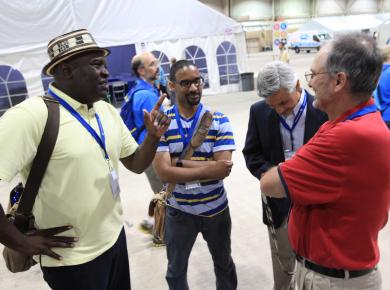Posted: October 21, 2015
By all accounts, the 16th Mennonite World Conference Assembly 21–26 July 2015 in Harrisburg, Pennsylvania, USA, was a resounding success. Memories of worshiping with more than 8,000 people from 65 countries; unexpected encounters with old and new friends; the beautiful profusion of sights and sounds of a truly global church; workshops on challenging topics and creative forms of witness; and the fragments of soul-transporting music that still linger in my memory – all this, and more, made the gathering a truly joyful experience.
Oddly enough perhaps, the highlight of the assembly for me was not anything generated by the global Mennonite and Brethren in Christ participants. Rather it was the ecumenical greetings brought to our gathering by Martin Junge, the Chilean general secretary of the Lutheran World Federation.
In his brief presentation, Junge celebrated “the gift of reconciliation and forgiveness” that took place between Mennonites and Lutherans in 2010 at the LWF assembly in Stuttgart, Germany. But then, Junge argued that reconciliation among members of the body of Christ can never be an end in itself. “Reconciliation had to unfold its full meaning,” he said, “by becoming a witness of God’s good intentions to the entire world.”
He noted a significant financial contribution Mennonites had recently made to support the needs of some 500,000 Somalians temporarily housed in a refugee camp administered by the LWF. This shared support for refugees “helped us come down from the top of the mountain, where we Mennonites and Lutherans were enjoying Christ’s presence,… to realize that the glory of Christ that shone to us needed to speak to the people in the valleys – to their struggles, to their pain, to their sufferings. Only thus does reconciliation become complete.”
“More than ever before,” Junge continued, “I have become aware that steadfastness in Christ today means to offer unity as a prophetic witness in our fragmented and wounded world.”
So why were these brief words, shared in a context of so many wonderful events, such a highlight for me?
First, in the context of a family reunion where we can easily become self-absorbed in the celebration of our distinctive gifts as an Anabaptist-Mennonite body, Junge’s words reminded us that we are also part of a much larger body of Christian believers. Although many in our circles remain deeply skeptical about “ecumenism,” the body of Christ nonetheless extends far beyond our membership in MWC. On our own, our witness to the world is incomplete; we need the gifts of every member of the Christian body.
Junge’s brief presentation also served as an important reminder to Mennonites that we are not imprisoned by our past – history is not destiny. To be sure, the shadow cast by the legacy of persecution in the 16th century did not simply disappear with the Lutheran-Mennonite service of reconciliation in 2010. But the story of our reconciliation is as much a historical fact today as the more familiar martyr narratives of Anneken Jans and Dirk Willems.
Our commitment to reconciliation is an announcement to the world that change is possible: former enemies can become friends; painful memories can be reframed; transformation in the direction of God’s shalom is possible.
Finally, I keep returning to the words of Martin Junge because I know that our faith and our fate as Anabaptist-Mennonites is inextricably linked to the question of unity in the body of Christ.
There are so many reasons to divide. Often, our first impulse is to assume that faithfulness to Christ is in tension with the goal of unity, as if faithfulness and unity were at opposite ends of some spiritual scale. But what if Christian faithfulness – as Jesus suggested in John 17 – were actually impossible without unity?
In her plenary presentation, Wieteke van der Molen, a Mennonite pastor from the Netherlands, invited MWC members to consider the space between us as “sacred space” – a space that could be bridged only by the living presence of the Spirit. What if we looked on our differences not as a source of fear or anxiety but as sacred spaces that only God can fill?
- John D. Roth, MWC Faith and Life Commission, secretary
A fuller version of this article appeared in The Mennonite. Originally posted at https://themennonite.org/opinion/is-christian-faithfulness-possible-without-unity/ on 27 August 2015.


Join the Conversation on Social Media
FacebookTwitterInstagramFlickrYouTube